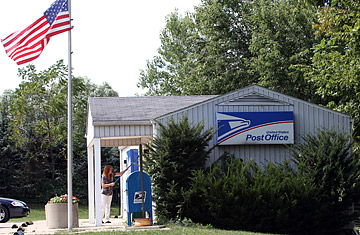
The post office in Millington, Ill., pop. 665, is one of many small-town post offices slated to close as a result of the U.S. Postal Service's financial problems
(4 of 5)
According to Donahoe, officials are looking at two types of post offices that could be closed: rural post offices that have less than an hour's work a day and urban post offices that generate less than half a million dollars in revenue and have another post office nearby. But to some, shutting down post offices seems not only reckless but also pointless.
"Closing post offices has almost nothing to do with the financial problem that the postal service finds itself in today," says Hutkins, founder of savethepostoffice.com. "Virtually nothing. The cost of operating these post offices and the amount of money that will be saved by closing them is minuscule in the context of the budget of the postal service and the deficit that it's running."
Hutkins teaches courses at NYU on our sense of place and how traveling affects our behavior. He got interested in post offices when he heard his post office in Rhinecliff, N.Y., was going to close. So he fought back. With magnets.
He began artfully constructing refrigerator magnets with a photograph of his post office on them and then handed them out to raise awareness around town. What concerns him is not just losing an important service but also what he sees as willful destruction of something that helped build the country. And he thinks postal officials aren't being truthful about it.
By the USPS's calculations, closing all the 3,650 post offices up for review would save just $200 million, or 2% of the deficit of about $10 billion. But it would also eliminate thousands of jobs. "This is a problem I really struggle with because it seems so irrational," Hutkins says. When you get him going, he has a litany of complaints against an institution he holds dear to his heart — the way the USPS is explaining the post-office closures to communities, how it uses "emergency suspension" procedures to eventually close post offices that have been damaged by natural disasters, how it's laying off not 100,000 workers but actually more than 200,000 through what the postal service calls attrition.
When I asked Donahoe about the post-office closings and if they amounted to only about 2% of the deficit, he, surprisingly, agreed.
"It's pretty close to being accurate," he said. "If you think about it from a $20 billion perspective" — the amount the USPS is trying to cut — "it's about 1% of that. But any other business would do this, and the postal service by law is required to do better than break even."
True, any other business might do this, but that's what makes this debate so difficult. The USPS is a quasi-governmental public utility. It's a semiautonomous organization that is partly private, partly governmental.
"The rhetoric of business is a way to push the postal service toward privatization," Hutkins says. "That's ultimately what this is all about. My one theory is they're just penny-wise and pound foolish, and it may simply be that they're so locked in to the mind-set that if they can save a nickel, that's reason enough to close a post office."
